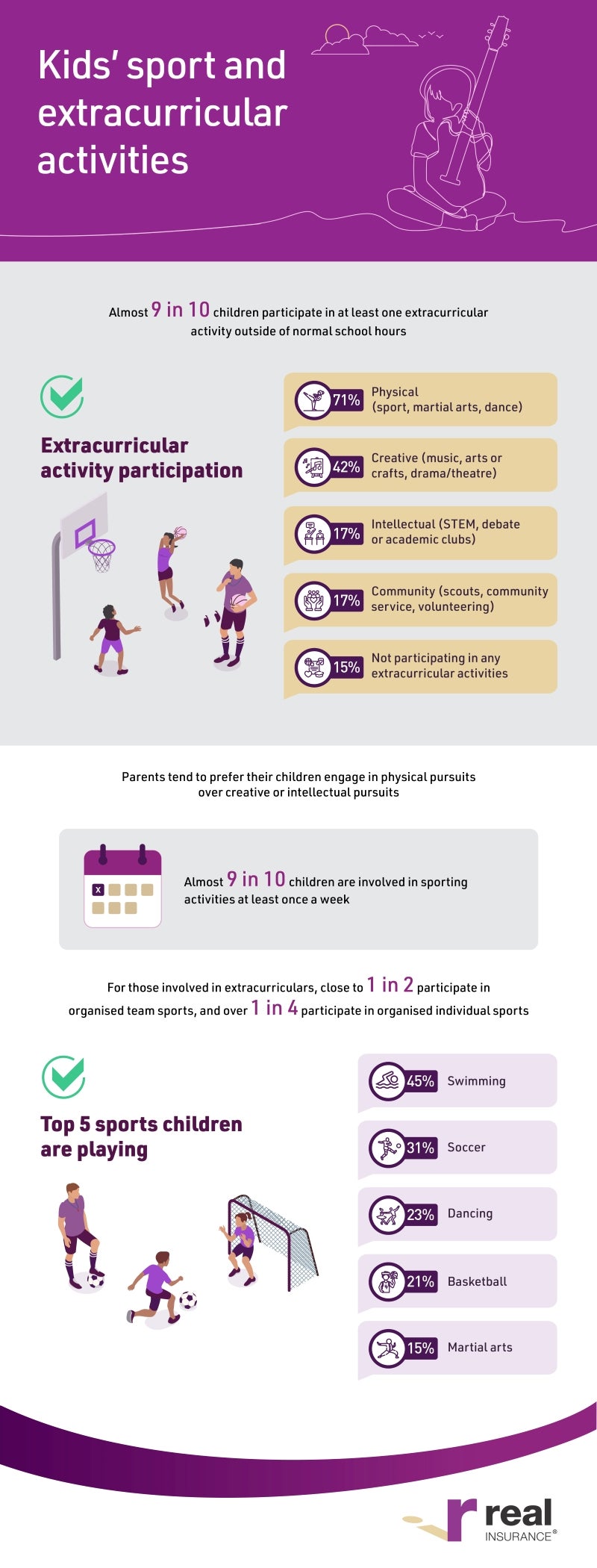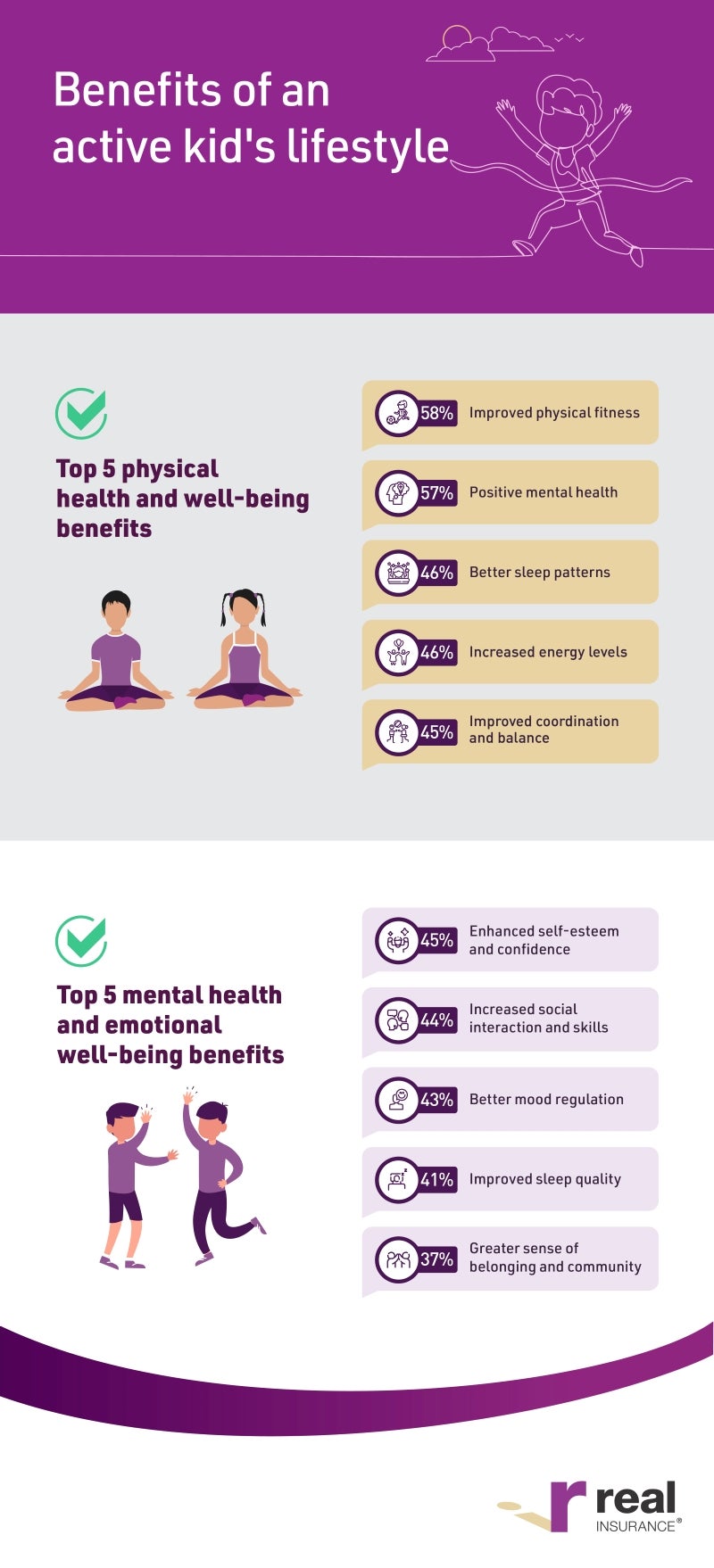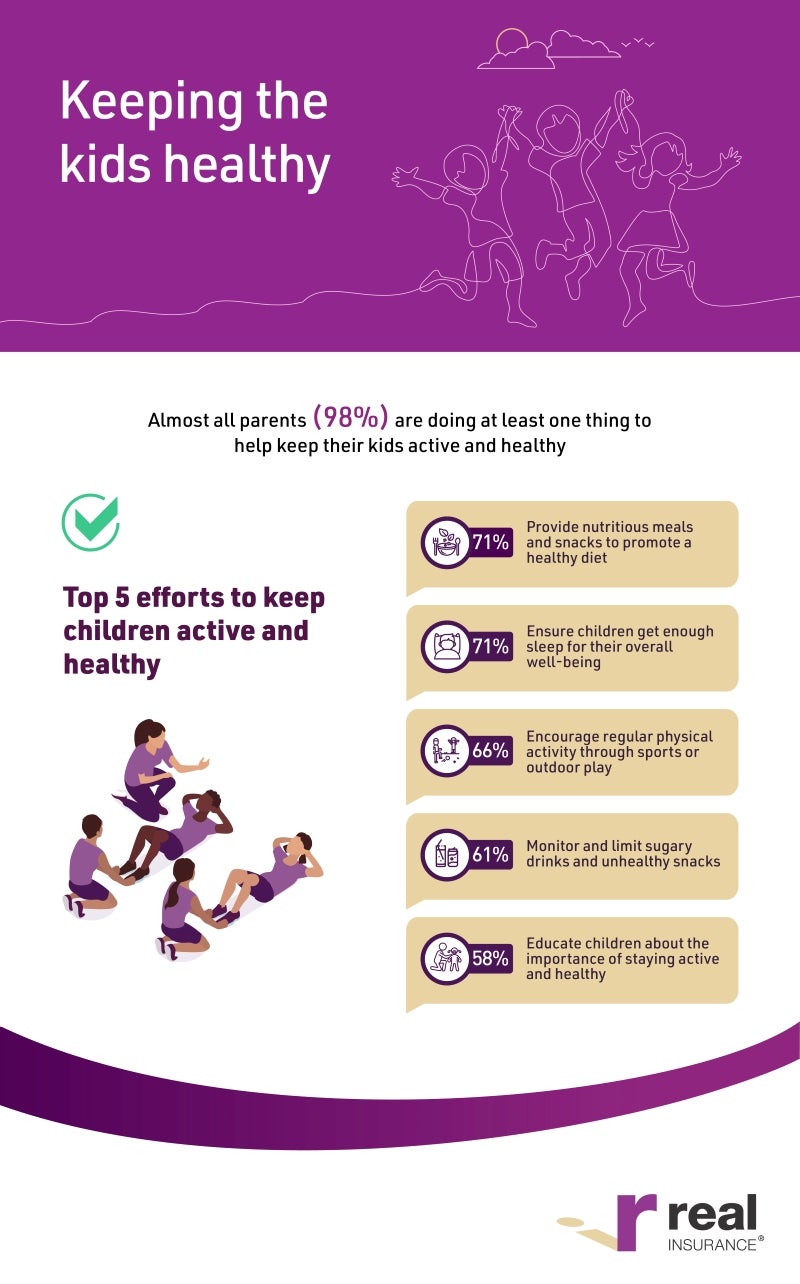The Real Healthy Kids Report 2024
17 May 2024
Raising healthy kids used to be simpler. What used to be sleep, sport, and sensible diets is now screen time, social media, and the occasional lunchbox shaming. So, what does it take to raise a healthy family in 2024?
The Real Healthy Kids Report 2024 continues our research from The 2017 Australian Active Kids Report, exploring the multifaceted landscape of parenting in contemporary Australia. From fostering positive relationships with physical activity to nurturing creative talents, the ways in which Aussie parents support their children's holistic development are varied and dynamic. In fact, almost 9 in 10 (85%) Aussie kids participate in at least one extracurricular activity, with many choosing physical activities (71%), followed by creative pursuits like music and art (42%).
If made to choose, nearly two-thirds (64%) of parents would prefer their kids to engage in physical activity over creative (21%) or intellectual pursuits (12%).
Regardless of parent preferences, committing to well-rounded development comes at a price. The report found a 49% surge in the cost of extracurricular activities when compared to the Real Active Kids Report 2017. Thanks to inflation, among other factors, the average parent with an active kid is now spending $3,255 each year on a variety of activity-related costs, up from $2,180 in 2017.
With rising costs placing pressure on household budgets, Real Insurance is here to help families protect what matters most. Our life insurance and income protection options are designed to offer financial peace of mind, so parents can continue investing in their children’s health and development without added stress.
What extracurricular activities are captivating kids?
According to new research, swimming has emerged as the top pick among Aussie kids who are involved in sports, with almost half (45%) taking part – thank you, Nippers and swim squads! Soccer (31%) and dancing (23%) take second and third place, showing a demand for a diverse range of activities.
Interestingly, the research found that just 13% of kids are playing our national sport, cricket, tying with gymnastics, AFL and cycling. While sports like basketball (21%) and martial arts (15%) proved to be more popular among Aussie kids.
For soccer enthusiasts, almost a quarter of Aussie parents with sporty kids (24%) believe their kids were inspired by the Matildas – not surprising after their epic Women’s World Cup effort in 2023! The Socceroos (19%) and Australian men’s cricket team (9%) followed as the next most inspirational national sports teams. Could soccer be vying for the position as our new national sport?

Benefits of physical activity
When it comes to why parents want their kids to participate in sports, a variety of associated benefits were identified, many extending beyond the field. Most parents with an active kid (68%) believe that sport has helped improve their kids’ academic performance, while increased confidence (58%), teamwork and collaboration (56%), and stress relief and fun (48%) were commonly noticed among kids involved in extracurricular activities.
Clinical Psychologist working with children and teens and Director, Developing Minds, Kirrilie Smout commented: “It can be helpful for parents to keep talking with kids about their experiences in their extracurricular activities. Ask them about what they enjoyed, what they didn't enjoy and what they wish was different. Parents don't have to "rescue" kids from challenging experiences but it is useful to role play or coach them through how they manage social pressures.”
Parents also cited a positive correlation between an active lifestyle and healthy sleep, with almost half (46%) noticing better sleep patterns in active kids, indicating a positive correlation between an active lifestyle and healthy sleep. Increased energy levels (46%) and improved coordination and balance (45%) were also found to be key outcomes of an active lifestyle.

Raising healthy kids: The parental commitment
In 2024, almost all (98%) Aussie parents are doing at least one thing to help keep their kids active and well by providing nutritious foods (71%), ensuring sufficient sleep (71%) and encouraging regular physical activity through sports or outdoor play (66%) topping the list.
Most parents (72%) are dedicating time to supervising and driving their kids to various activities to encourage them to get outdoors more, a notable increase from 55% in 2017. Many parents are also going out of their way to find things that will interest their kids (55%) and regularly reminding them how important it is to stay active (45%), both up from 2017 (41% and 39%, respectively).
It comes as no surprise that parents with kids involved in sports and extracurricular activities are spending 11.1 hours per week on average fulfilling their kid’s various commitments. The most time-consuming activities being sports (4.3 hours), creative and intellectual pursuits (3.9 hours), and medical and health-related activities, such as routine check-ups (2.4 hours).
If you find it all challenging at times, between the carpooling, preparing healthy snacks and washing school uniforms, you’re not alone. In fact, almost 9 in 10 (86%) Aussie parents find it challenging to balance the time it requires to support their children’s wellbeing and other commitments.
However, according to research, many parents (60%) with sporty kids are happy to get involved in their kid’s sporting activities, proving that all the drop offs, pick-ups, and coordination is worth it!
Kirrilie Smout commented: “It is not uncommon for Australian parents and caregivers to experience high levels of parent stress and distress – and even parental burnout. The reality is that day to day caring for young people can be extremely demanding for many parents – especially those with children with higher needs. There are no easy answers, but parents should try to keep prioritising their own sleep, time to relax, exercise and nutrition needs, even at the expense of their children at times.
It can also be important to make a note of the beliefs and thoughts we have as parents which make us feel stressed at times – seeing these in writing can help us notice if they are unrealistic – help us talk to ourselves in more realistic and kind ways. It’s also important – even though it is hard - to reach out to other parents to say hi or share the load. Even sending a text or email to other school parents to keep up some connection can help over the long term.”
The cost of raising a healthy family
Unfortunately, it’s not just the activities themselves that have become more expensive.
If you’ve found yourself staring in disbelief at the price increase of potatoes or iceberg lettuce the last time you went grocery shopping, you’ll understand the financial strain many parents face in providing nourishing meals for their families.
According to the research, the average Australian parent estimates spending $8,294 annually on healthy food options – an amount comparable to a lavish family holiday! And a staggering 77% are feeling the pinch financially when it comes to ensuring their kids have access to healthy food.

Community connection comes out on top
The events of the past few years have certainly increased the focus on social connection and overall well-being, with many seeing the benefits more than ever.
Sports and other physical activities are a great way for kids to meet new people and be exposed to different situations.
The research found that almost all Aussie parents (92%) agree that sporting and physical activities are important social opportunities for their children. When it comes to community, more than 9 in 10 (92%) feel that their children's participation in extracurricular activities contributes significantly to a sense of belonging in the community.
But it’s not all about the kids! More than 3 in 4 (76%) believe it’s also important for their own social and community involvement.
However, it’s not without social politics. Only a third (35%) of parents have been lucky enough not to witness any pressure or shaming from teachers, schools, or other parents. Boasting (32%), gossiping and judgement (28%), and passive-aggressive behaviour (21%) are reportedly common both on and off the field.
Unfortunately, lunchbox shaming has been witnessed or experienced by 2 in 5 (42%), with these parents receiving criticisms about food quantity (34%), and 'weird' (34%) and unhealthy (30%) food choices.
Vaping fears
It’s become increasingly clear that vaping is right on our doorsteps, with a quarter (25%) of Aussie parents suspecting their children are vaping or have caught them before.
Shockingly, the estimated average age that children are first trying vaping is around 13 years old – 5 years below the legal age to purchase nicotine products in Australia.
Although parents are facing many challenges in trying to prioritise their kids’ wellbeing by taking steps towards nurturing the physical, mental, and emotional health, parents and caregivers play a crucial role in shaping a more robust future generation of Aussies.
See the full Real Healthy Kids Report 2024 here.

Kirrilie Smout
Kirrilie has worked as a clinical child and adolescent psychologist for the last 25 years in private, government and community settings. Kirrilie is now the director of Developing Minds, a group of 23 child and adolescent psychologists, has provided therapy to approximately 5,000 children, teens and families and supervised over 60 child and adolescent psychologists. She is also a lecturer and course co-ordinator at the University of South Australia, authored three books about young people and provides consultation to national media, education and health organisations.